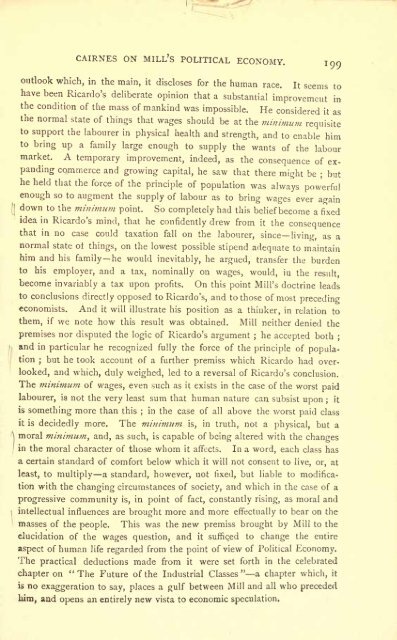John Stuart Mill: A Criticism with Personal Recollections
John Stuart Mill: A Criticism with Personal Recollections
John Stuart Mill: A Criticism with Personal Recollections
Create successful ePaper yourself
Turn your PDF publications into a flip-book with our unique Google optimized e-Paper software.
! down<br />
CAIRNES ON MILL S POLITICAL ECONOMY. 199<br />
outlook which, in the main,<br />
it discloses for the human race. It seems to<br />
have been Ricardo s deliberate opinion that a substantial improvement in<br />
the condition of the mass of mankind was impossible. He considered it as<br />
the normal state of things that wages should be at the minimum requisite<br />
to support the labourer in physical health and strength, and to enable him<br />
to bring up a family large enough to supply the wants of the labour<br />
market. A temporary improvement, indeed, as the consequence of ex<br />
panding commerce and growing capital, he saw that there might be ; but<br />
he held that the force of the principle of population was always powerful<br />
enough so to augment the supply of labour as to bring wages ever again<br />
to the minimum point. So completely had this belief become a fixed<br />
idea in Ricardo s mind, that he confidently drew from it the consequence<br />
that in no case could taxation fall on the labourer, since living, as a<br />
normal state ot things, on the lowest possible stipend adequate to maintain<br />
him and his family he would inevitably, he argued, transfer the burden<br />
to his employer, and a tax, nominally on wages, would, in the result,<br />
become invariably a tax upon profits. On this point <strong>Mill</strong> s doctrine leads<br />
to conclusions directly opposed to Ricardo s, and to those of most preceding<br />
economists. And it will illustrate his position as a thinker, in relation to<br />
them, if we note how this result was obtained. <strong>Mill</strong> neither denied the<br />
premises nor disputed the logic of Ricardo s argument he ; accepted both ;<br />
and in particular he recognized fully the force of the principle of popula<br />
tion ; but he took account of a further premiss which Ricardo had over<br />
* moral<br />
looked, and which, duly weighed, led to a reversal of Ricardo s conclusion.<br />
The minimum of wages, even such as it exists in the case of the worst paid<br />
labourer, is not the very least sum that human nature can subsist upon ; it<br />
is something more than this ; in the case of all above the worst paid class<br />
it is decidedly more. The minimum is, in truth, not a physical, but a<br />
minimum, and, as such, is capable of being altered <strong>with</strong> the changes<br />
in the moral character of those whom it affects. In a word, each class has<br />
a certain standard of comfort below which it will not consent to live, or, at<br />
least, to multiply a standard, however, not fixed, but liable to modifica<br />
tion <strong>with</strong> the changing circumstances of society, and which in the case of a<br />
progressive community is, in point of fact, constantly rising, as moral and<br />
intellectual influences are brought more and more effectually to bear on the<br />
masses of the people. This was the new premiss brought by <strong>Mill</strong> to the<br />
elucidation of the wages question, and it sufficed to change the entire<br />
aspect of human life regarded from the point of view of Political Economy.<br />
The practical deductions made from it were set forth in the celebrated<br />
chapter on "The Future of the Industrial Classes" a chapter which, it<br />
is no exaggeration to say, places a gulf between <strong>Mill</strong> and all who preceded<br />
him, and opens an entirely new vista to economic speculation.

















